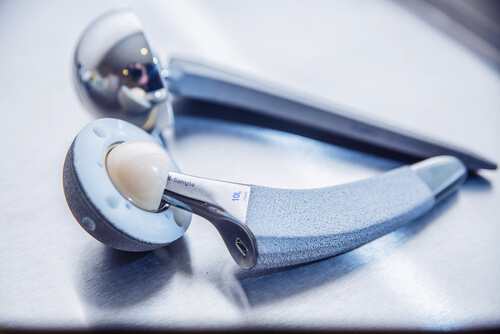
Stryker Hip

Stryker Hip Implants May Cause Metal Poisoning, Other Serious Injuries
The Stryker Hip injury law firm The Driscoll Firm, LLC, is investigating potential lawsuits throughout the United States on behalf of victims who received a Stryker brand hip implant.
In July 2012, Stryker voluntarily recalled its Rejuvenate and ABG II implant systems due to risk of injury. The move came under pressure from the U.S. Food and Drug Administration (FDA). The Rejuvenate devices have a metal neck inside a metal stem. The FDA received complaints of fretting or corrosion of the components, which Stryker said “may be predictive of a trend.”
Fretting or corrosion can result in damage to body tissue, according to Stryker. Among other side effects:
- Metal poisoning
- Pain and discomfort
- Swelling and inflammatory reactions
- Breakdown of muscles, tendons and soft tissue in and around the hip joint
- Bone loss
- Diminished quality of life
- Decreased mobility
Stryker’s Trident brand of ceramic hip implants was previously recalled.
If you or a loved one has suffered painful side effects or injuries from a Stryker Rejuvenate hip implant – or from a previously-recalled Stryker Trident brand hip implant – contact The Driscoll Firm, LLC, at 314-932-3232 to find out if a Stryker Hip injury lawyer can help you. The consultation is free and confidential.
Recalls of Both Metal and Ceramic Hip Implants
The Rejuvenate-ABG II recall is the second major recall of a Stryker hip implant product. In January 2008, the company pulled its Trident Acetabular PSL and Trident Hemispherical Cups off the market. The Trident device, first introduced in 2003, was made of ceramic and used for the socket portion of hip replacements. The Trident recall came after numerous complaints and two FDA warning letters to Stryker. The FDA warned the manufacturer that:
- The Trident implants were “adulterated” as defined by federal law. (March 15, 2007 FDA warning letter)
- “[T]he methods used in, or the facilities or controls used for, their manufacture, packing, storage, or installation [at the Stryker manufacturing facilities in New Jersey and Cork, Ireland]are not in conformity with the Current Good Manufacturing Practice (CGMP) requirements of the Quality System (QS) regulation.” (March 15, 2007 FDA warning letter)
- “[C]ustomer complaints have been received for squeaking/noisy ceramic on ceramic hip joints.” (November 28, 2007 FDA warning letter)
In June 2008, the FDA approved Stryker’s metal-on-metal Rejuvenate device. As with the Trident series, complaints about the Rejuvenate implants soon began to surface. In April 2012, Stryker released an Urgent Field Safety Notice of Corrective Action acknowledging problems with the device, including:
- Excessive metal debris and/or ion generation
- Excessive fretting (deterioration)
- Possible need for revision surgery.
Hip replacement surgery is usually recommended for patients suffering from (a) osteoarthritis, (b) rheumatoid arthritis, or (c) fractures. Some patients who received Stryker implants have had to undergo costly revision surgeries to correct the problems with the Trident and Rejuvenate devices. Others have simply endured the pain, discomfort, swelling and diminished quality of life.
Contact a Stryker Hip Litigation Lawyer Today
The lawyers of The Driscoll Firm, LLC, are investigating national injury claims related to complications arising from the use of Stryker Hip implants. If you or a loved one has had a Stryker Hip implant and has experienced squeaky joints, popping joints, pain, swelling, loss of mobility or other problems, phone 314-932-3232 today to speak to a Stryker Hip litigation attorney about your case.
The Driscoll Firm, LLC, has represented clients injured by dangerous pharmaceuticals and medical devices for more than a decade. John J. Driscoll solely represents plaintiffs and focuses his practice on complex product liability cases, consumer class actions and personal-injury litigation.
For more information:







